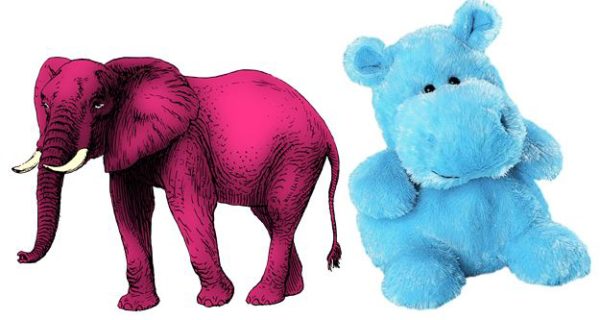Let’s begin with an exercise: I don’t want you to think about a pink elephant. What did you do? Well, you thought of a pink elephant, of course. But don’t think about a pink elephant, don’t think about a pink elephant, don’t think about a pink elephant! Does that help you not think about a pink elephant? To the contrary, it makes it harder to ignore that pink elephant. I’ll return this jungle animal shortly, but first some background.
Back in the 2000s, I raced two Ironmans, a bunch of 70.3s, and some shorter races (including four Escape from Alcatraz). I then took an 11-year break from triathlon during which time I focused on my career and family. I stayed active with biking and running but didn’t do a lap in the pool the entire time. Then, in 2019, I was out for a run and, all of a sudden, my tri-mojo came surging back. I pulled my tri-bike out of storage (amazing that I kept it!) and three weeks later, I did my first Olympic-distance race (Dave Campbell beat me by 25 minutes!). I’ve been hooked ever since.
2019, I was out for a run and, all of a sudden, my tri-mojo came surging back. I pulled my tri-bike out of storage (amazing that I kept it!) and three weeks later, I did my first Olympic-distance race (Dave Campbell beat me by 25 minutes!). I’ve been hooked ever since.
With each triathlon season, my fitness and results have improved and 2022 was my breakout season in which I finished 5th in the Sprint at Nationals in Milwaukee, and 3rd in the Super-sprint and 9th in the Olympic in my age group at the World Championships in Abu Dhabi. These results definitely lit an even hotter burning fire under me, particularly given that I was at the top of my age group and was still able to compete against the “youngsters” 4-5 years younger than I am. I aged up this season and am now in the enviable position of being one of those youngsters in my new age group.
I’ve been working really hard in preparation for the 2023 season, focusing especially on improving my  swim and bike (both pretty mediocre in the past), and maintaining and building on my run speed (my real strength in triathlon). And my testing results and recent race results have showed that my hard work is paying off.
swim and bike (both pretty mediocre in the past), and maintaining and building on my run speed (my real strength in triathlon). And my testing results and recent race results have showed that my hard work is paying off.
Now, back to that pesky pink elephant. One of the most important things I say to the athletes I work with is: Expectations are the kiss of death! And that’s what the pink elephant represents. So much of my work with athletes is getting them to let go of their outcome expectations and just focus on what they need to do to be physically and mentally ready to race their fastest and have fun.
The USAT Multisport National Championships are happening this week in Texas where I’m racing in the Super-sprint, Sprint, and Mixed Team Relay events. I have some very big outcome goals for the events! The problem is that I haven’t been taking my own advice and those goals had morphed into outcome expectations in which I’m focusing on the results, who my likely competitors will be, and how fast I need to go to achieve my outcome goals. As a result, I’ve been more nervous and uncertain than usual. Here’s where the “I practice what I preach” comes into play.
Why are Outcome Expectations So Bad?
The dictionary defines expectations as “a strong belief that something will happen in the future…a belief that someone will or should achieve something.” At first glance, an expectation seems like a pretty good thing because it suggests that someone is capable of fulfilling the expectation and that they or others have confidence in meeting the expectation. However, upon closer examination, expectations can feel more like a burden that actually prevents you from performing your best and meeting the expectation.
confidence in meeting the expectation. However, upon closer examination, expectations can feel more like a burden that actually prevents you from performing your best and meeting the expectation.
First, expectations have a sense of certainty that you will get a particular result. But, as any triathlete knows, there is little certainty in our sport where external factors (e.g., weather, water, road surface, terrain), equipment failure (e.g., flat tire), and the vagaries of luck (e.g., getting your goggles knocked off during the swim, an unseen pothole), can turn expectations on their head.
Second, with that sense of inevitability comes a feeling of already having fulfilled the expectation. And if you don’t end up meeting the expectation, the “failure” can feel devastating.
Third, there is an implicit threat that lies hidden in every expectation, almost as if there is an invisible “…or else” that can be found at the end of an expectation, for example, “I expect to win…or else I will be  terribly embarrassed.” An expectation puts you in a position where you feel that you absolutely must fulfill it or something bad will happen. As a result, expectations can create a threat reaction.
terribly embarrassed.” An expectation puts you in a position where you feel that you absolutely must fulfill it or something bad will happen. As a result, expectations can create a threat reaction.
Finally, expectations are all-or-nothing propositions; there is no gray area around them. You either fulfill the expectation and succeed or you don’t, and you fail. This means that there is only a small opportunity to succeed and a very large chance of failure.
Expectations and Emotions
When I ask triathletes about expectations, their reactions are pretty much the same. They frown, grimace, and get uncomfortable. They say things like “I hate it when people expect things from me.” and “When I build up expectations about a race, I feel totally weighed down.”
Very powerfully, expectations take a big emotional toll on triathletes. Expectations produce emotional reactions that both feel bad and usually hurt performances. Before a race, expectations create pressure to fulfill the expectations and fear that you won’t, hurting you both psychologically and physically. That’s how I was feeling as the TX races approached.
reactions that both feel bad and usually hurt performances. Before a race, expectations create pressure to fulfill the expectations and fear that you won’t, hurting you both psychologically and physically. That’s how I was feeling as the TX races approached.
From Pink Elephant to Blue Hippo
I hope that I’ve convinced you that expectations will do you no good as you pursue your triathlon goals. But, if you are at all competitive (and I certainly am!), results do matter in our sport and I simply can’t prevent you or myself, as a competitive triathlete in a competitive sport in a competitive culture, from thinking about results. So, my challenge is to allow myself to think about results (at least temporarily) but create a better alternative than expectations. My solution is to focus on goals, not expectations. Goals might seem little different than expectations, but they are, in fact, completely different animals, in this case, a blue hippo.
 Here’s another exercise: I want you to think about a blue hippo. What did you do? Well, you likely thought about a blue hippo. And what did you not think about? Oh wow, you didn’t think about that irritating pink elephant. So instead of trying to push that pink elephant out of the room (have you ever tried to move a pachyderm of any color, even a baby?), you simply turn away from it and focus on the blue hippo.
Here’s another exercise: I want you to think about a blue hippo. What did you do? Well, you likely thought about a blue hippo. And what did you not think about? Oh wow, you didn’t think about that irritating pink elephant. So instead of trying to push that pink elephant out of the room (have you ever tried to move a pachyderm of any color, even a baby?), you simply turn away from it and focus on the blue hippo.
Goals are deeply rewarding. You feel pride, inspiration, excitement, and joy in setting and pursuing goals, and seeing that effort rewarded. Also, unlike expectations and their air of certainty, goals are about the possibility of achievement if you work hard and give your best effort, so if things don’t work out for you, you’re disappointed, but not devastated.
One great thing about goals is that they aren’t black and white like expectations, but rather about degree of attainment. Not every goal can be achieved, but there will almost always be improvement toward a goal and that progress defines success. So, if you give your best effort, there is little chance of failure and great opportunity for success. When I ask triathletes about goals, they convey a very different message. Their faces perk up and they say things like, “It means I decide to do something, and I want to work really hard to do it.”
opportunity for success. When I ask triathletes about goals, they convey a very different message. Their faces perk up and they say things like, “It means I decide to do something, and I want to work really hard to do it.”
The emotional experience of goals is also very different from those of expectations. Before a race in which you set goals, you are really motivated and excited to compete because you have a challenge, rather than threat, attitude.
From Blue Hippo to Green Rhino
So, if you’re going to set something related to results, set outcome goals, not expectations. But don’t stop there. There’s another step you must take that will increase your chances of success even more. Once you have established goals for the results you want, immediately shift from outcome to process, and set goals for what you need to do to achieve your outcome goals. That’s the green rhino. Examples might include setting goals to be totally prepared before a race, focusing on a specific race strategy, or deciding to push your limits and seeing what will happen.
 There are several key elements about process goals that distinguish them from outcome goals. First, if you achieve the process goals, you are very likely to achieve the outcome goals you set for yourself because you are more likely to perform well. Second, unlike outcome goals, process goals are entirely within your control, so you have the power to act on them or not. Additionally, because they are controllable, you are able to exert control over the quality of your performances and, by extension, the results that you pursue.
There are several key elements about process goals that distinguish them from outcome goals. First, if you achieve the process goals, you are very likely to achieve the outcome goals you set for yourself because you are more likely to perform well. Second, unlike outcome goals, process goals are entirely within your control, so you have the power to act on them or not. Additionally, because they are controllable, you are able to exert control over the quality of your performances and, by extension, the results that you pursue.
This is precisely what I’ve been doing the last few days in my final preparations for the TX races. I’ve definitely noticed the pink elephant periodically, but mainly I’ve been focusing on the green rhino, that is, my process goals and what I need to do to be ready for my upcoming races. And there has been a sea change in my attitude and emotions. I made the shift from threat to challenge, obstacles to opportunities, and, very importantly, from dread and anxiety to anticipation and excitement. In other words, my tri-mojo is coursing through my veins, and I can’t wait to get to Texas and push myself to new limits. As for results, well, I’m feeling good about my chances and, more importantly, I’m ready to do battle and see what I’m capable of.
change in my attitude and emotions. I made the shift from threat to challenge, obstacles to opportunities, and, very importantly, from dread and anxiety to anticipation and excitement. In other words, my tri-mojo is coursing through my veins, and I can’t wait to get to Texas and push myself to new limits. As for results, well, I’m feeling good about my chances and, more importantly, I’m ready to do battle and see what I’m capable of.







